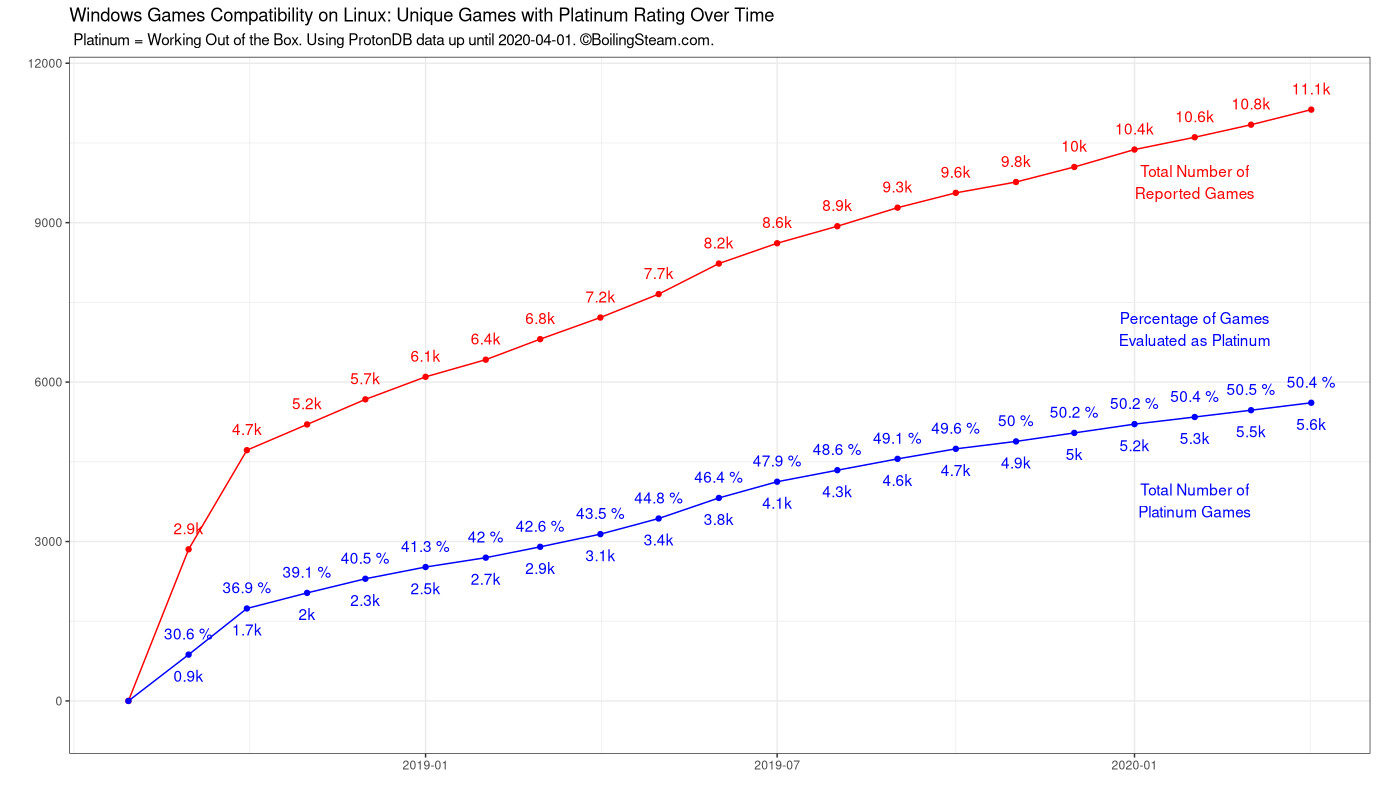Chisulo.a
Shared posts
James 'Scotty' Doohan's ashes may have been smuggled aboard the ISS
Daft Punk released an extended edition of its 'Tron: Legacy' score
Naked Panda Man Rollerblading Down The Interstate Remains Unidentified

On Wednesday video circulated around social media in which an unidentified man — we’ll call him ‘the protagonist’ — wearing nothing but an oversized panda costume head and rollerblades ripped his way down I-670 in Columbus, Ohio holding a selfie stick. The video appears to be from this week, which saw daily high…
The Hugo Awards will have a video game category in 2021
Company made to change name that could be used for website hacks
Tesla Tequila goes from April Fools joke to $250-per-bottle reality
Russia's Airbrushed Car Scene Is Out Of Control

You’re driving down the road. Suddenly, a Toyota RAV4 pulls up beside you. Sprayed on its focus group-derived curves is a chihuahua, posing gracefully before a waterfall.
Disney+ is reviving 'Willow' as a TV series
Video Shows Youth Hockey Suffer Wrath Of 'Zamboni' From Hell
Chisulo.aNope, still not watching hockey.

Everybody is reportedly fine after a group of kids playing ice hockey were confronted with a ice resurfacing machine, commonly known as a Zamboni though this one is a different brand, and its operator completely engulfed in flames doing a lap of the rink earlier this week.
Hackers could have locked users inside a smart chastity device
The Arcwave Ion is designed to 'give men a female orgasm'
Chisulo.a???
...
!!!
Ring made a security drone that flies around inside your home
Chisulo.aCountdown to this thing being used to make amateur porn in 3...2...1...
Let's Remember The Great Cars Of The Venture Brothers
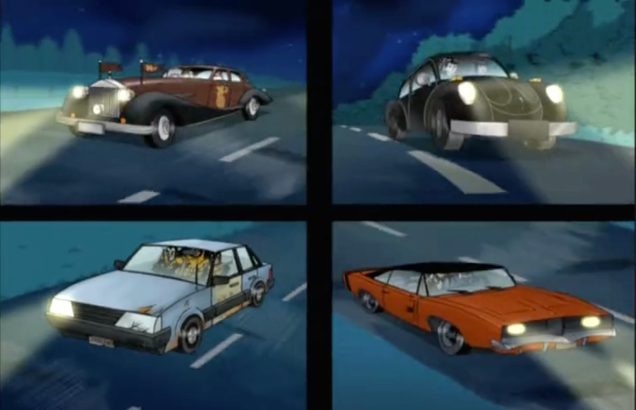
The Venture Brothers isn’t just one of my favorite animated shows, it’s one of my very favorite TV shows period. Adult Swim ended one of the longest-running shows in its line up this week after 81 episodes over 17 years. If you’ve never seen it (There’s no excuse, it’s been around for 17 years. Seriously, get your…
'Game of Thrones' duo are making a 'Three-Body Problem' series for Netflix
Chisulo.aFor the love of god, just read the books...
Try Not To Shit Yourself In Panic As A Toddler Is Pulled Into The Air By A Kite
Chisulo.adiaper probably came in handy there
First, just for the sake of everyone not pulling their sphincter muscles to the point of injury, let me make clear that the little three-year-old girl who, um, stars in this video is okay. She suffered some very minor abrasions, but is otherwise physically unharmed. Okay, with that out of the way, Here’s a video of a…
Elon Musk teases 'working Neuralink device' reveal on August 28th
YouTuber’s DIY gun shoots masks onto people’s faces
That Penis Car Craigslist Ad Is Fake But The Car's Real And Much More Interesting
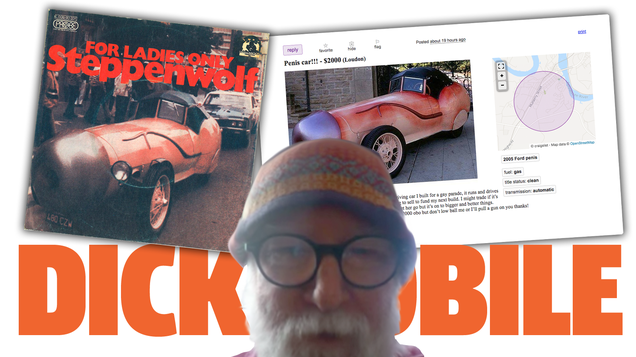
One of the best things about my job is that I’m now in the position that, when some alert gearhead at some random place in the world encounters something like, say, an ad for a car shaped like a human penis, I’m the person they reach out to. That’s exactly what happened today, when a reader named Joel sent me this…
This Blowjob Machine Designed For Teslas On Autopilot Is A Terrible Idea But Probably Not Why You Think

First, I need to be clear that I am not here to kink-shame anyone. Sex is great, masturbation is great, and you do whatever the hell you want to get yourself off, as long as everyone involved is thrilled to be a part of it. Now, with that out of the way, I have to say that I find the Automoblow, the “first sexual…
Watch the first trailer for the Apple TV+ 'Foundation' series
I Tried Manscaped Groin Spritzer and You Should Too
Chisulo.alets all try Groin Spritzer!

Manscaped Crop Reviver Groin Spritz | $11 | Amazon
Manscaped Electric Groin Hair Trimmer | $70 | Amazon
20 Undersung Crime Shows to Binge-Watch
Maybe it begins with a body in the woods, half-buried under bracken. Or with a glimmering shot of a city skyline. Or with a furtive deal, carried out at dusk, before an unknown character heads toward an untimely end. The clichés and conventions of crime dramas are their own strange reprieve because of what they tend to guarantee: After a trip into the murkiest corners of the human psyche, an arc will be completed, a villain (or several) will be captured, and the system will prevail.
Over the past two months at home, the shows I’ve craved have either been mindless sitcoms (the televisual equivalent of a bowl of ice cream) or a certain subgenre of crime procedural, many of them British, unfailingly bleak, and loaded with top-tier actors wearing baggy woolen knits and surly expressions. These kinds of shows, as Matthew Gilbert wrote in the Boston Globe a few years ago, aren’t simple TV diversions in the Law & Order mold as much as they’re “haunting reflections on tragedy.” They’re clear-eyed when it comes to the rot in the fabric of humanity, but they typically offer some consolation in the end. The detectives here are as fascinating as the people they profile, and occasionally almost as dark.
With this peculiar type of comfort in mind, here’s a list of some of the superlative crime-drama binges from the past decade that are available to stream. There are plenty of high-profile shows with similar attention to psychological depth (Better Call Saul, Unbelievable, American Crime, When They See Us, Fargo, Mindhunter, True Detective), but for the most part I’ve tried to stay away from obvious choices, to highlight some undersung options instead, grouped according to the things crime series do best. Not all are strict procedurals. Nor is this list exhaustive (The Bridge, Wallander, Borgen, and Trapped are among those deserving of their own inventory). Hopefully, though, you’ll find at least one or two new options to consider.
twisty and propulsive THRILLERS
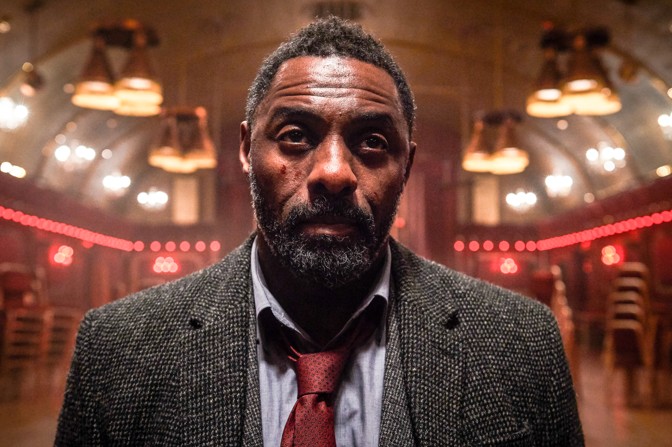
luther
It’s hard to imagine Luther functioning so well without Idris Elba, whose ability to radiate ennui and gravitas while stalking through London in a gray tweed jacket is at least half the show’s appeal. Everything else in Neil Cross’s five-season series, which debuted in 2010, is ludicrous, Victorian-novel excess: serial killers in LED masks, occult blood fetishists, psychopathic academics with oral fixations who murder their entire families, right down to the dog, for attention. It’s the latter, Alice Morgan—a depraved genius played with operatic lunacy by Ruth Wilson—who becomes the Hannibal to Luther’s Clarice Starling, popping up to aid him and occasionally opine on the intricacies of the criminal mind. For all its absurdities, this is a series where the momentum rarely falters.
Watch it on: Hulu
The fall
Before Killing Eve, the knottiest cat-and-mouse game on television was between the icily glamorous Detective Inspector Stella Gibson (Gillian Anderson) and the swaggering serial killer in sweatpants, Paul Spector (Jamie Dornan). In the first season of the show, Gibson flew to Belfast to help investigate the murders of several young women, all of them committed by Spector, whose criminality The Fall revealed from the beginning. The narrative engine driving the show isn’t whodunit; it’s whether Gibson will solve the case before Spector strikes again, and whether either can curtail their growing obsession with the other. Anderson has never been more compelling as Gibson, a woman whose brilliance is grounded partly in her gender, and her ability to comprehend the psychology of a misogynist murderer. In the third and final season, The Fall veers slightly off the rails, but the first two alone make it worth watching.
Watch it on: Netflix
informer
For all the consolation of shows that stick to a formula, the ones that upend generic conventions can be even more gratifying. The hero of Informer isn’t Detective Sergeant Gabe Waters (Paddy Considine), a London counterterrorism officer trying to crack a ring behind attacks in other European cities. It’s Raza (played brilliantly by Nabhaan Rizwan), a second-generation British Pakistani man whom Gabe—in an act of callous ethnic stereotyping—coerces into informing on potential terrorists in his community, and who’s by far the show’s most sympathetic character. (“I don’t know any terrorists, bruv!” Raza exclaims in protest. “Not yet, but you will,” Gabe replies.) Even the ways in which Informer tweaks the visuals of London-set shows feel fresh—there are far more panoramic portrayals of Shoreditch streets and East London council estates than sweeping vistas of the Thames. And as the show barrels towards its climactic finale, it never loses sight of which people are victimized in the official quest to keep everyone else safe.
Watch it on: Amazon
marcellA
You can also file Marcella under “engagingly batty serials,” and yet for all my complaints about the show—its trope-y “troubled-but-brilliant heroine” setup not least among them—once I started watching, I couldn’t stop. Anna Friel (Pushing Daisies) plays the titular detective Marcella, who at the show’s outset has come back to active police work after a personal crisis and the seeming return of a serial killer she’d long hunted. The only problem is her ongoing blackouts, after which she tends to wake up muddy, covered in blood, and suspicious even of herself. Florence Pugh (Little Women) has a brief but committed arc in Season 1 as a sex worker who steals from her customers, and Downton Abbey’s Laura Carmichael also pops up as a student criminologist. But Friel is the real draw, giving her character just enough grit and vulnerability to keep viewers on her side.
Watch it on: Netflix
slow burnS
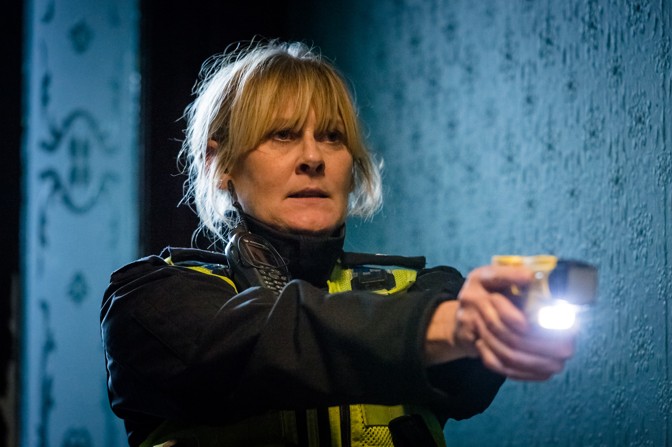
happy valley
Before writing HBO’s Gentleman Jack, Sally Wainwright created this spectacular two-season drama about an indomitable police sergeant in northern England, Catherine Cawood (Sarah Lancashire), whose tragic family history is messily knotted with the community she covers. Unlike many a popular British procedural, there are fewer pastoral landscapes for the camera to sweep over seductively—the term “Happy Valley” is used by police to describe the area because of its history with drugs and crime. The ostensible plot in the first season features a bungled kidnapping, but Catherine herself—defined by no-nonsense pragmatism, acute emotional intelligence, and the trauma she’s fighting as brusquely as possible—is the reason to keep watching.
Watch it on: Netflix
broadchurch
If superior British dramas are defined by their ability to chart both the process of crime-solving and the devastation violent crime leaves in its path, then few can equal Broadchurch, Chris Chibnall’s cult hit about the murder of a child on southern Britain’s Jurassic Coast. In its opening scene, the show takes viewers down a seaside town’s main street, as if to introduce all the players to come: the police detectives (played by David Tennant and Olivia Colman) investigating the crime, the parish church, and the home where two parents (Jodie Whittaker and Andrew Buchan) are sleeping. The dynamic between Colman’s Ellie Miller, a Broadchurch local, and Tennant’s newly hired Alec Hardy sustains the show’s energy—and its moments of humor—but the show also gives significant space to the grief of 11-year-old Danny Latimer’s family, and to the ripples that his death send through the community. If Broadchurch has a fault, it’s a reliance on charged conversations on the beach as waves crash stirringly to shore, but even those are so scenic that they’re hard to resent.
Watch it on: Netflix
a confession
Arriving on BritBox in May, this six-part import stars Martin Freeman (Sherlock) as a detective investigating a missing 22-year-old woman, although the series takes its time to set up the story’s major pieces. Instead, Jeff Pope (who wrote the series based on a real-life case that ended the career of the policeman involved) allows viewers to become acquainted with the characters before tragedy strikes, and to witness the slow creep of dread and panic as the scale of what’s happening becomes clear. If that doesn’t quite make for an immediate hook, it’s worth watching through the end of the first episode, by which time the elements have coalesced into something devastating. As the show proceeds, the weight of events bears down on everybody, including two mothers played by Siobhan Finneran and Imelda Staunton.
Watch it on: BritBox
national treasure
This Hulu anthology show actually consists of two series by Jack Thorne (Harry Potter and the Cursed Child) released under the same title. The first, which debuted a year before The New York Times’ reporting on Harvey Weinstein precipitated an outpouring of accusations against high-profile abusers, focused on a beloved comedian, Paul Finchley (Robbie Coltrane), who’s arrested one morning for decades-old charges of sexual assault. Impeccably structured, the four-part miniseries selectively reveals aspects of Paul that continually disrupt the question of what to make of him. The second show, Kiri, stars Happy Valley’s Sarah Lancashire as a social worker investigating the death of a 9-year-old black girl who’d been fostered by an upper-middle-class white family. This installment carefully exposed the tensions of race and privilege in British society, and the clamorous media circus that seizes on a murdered child.
Watch it on: Hulu
subversive storytelling
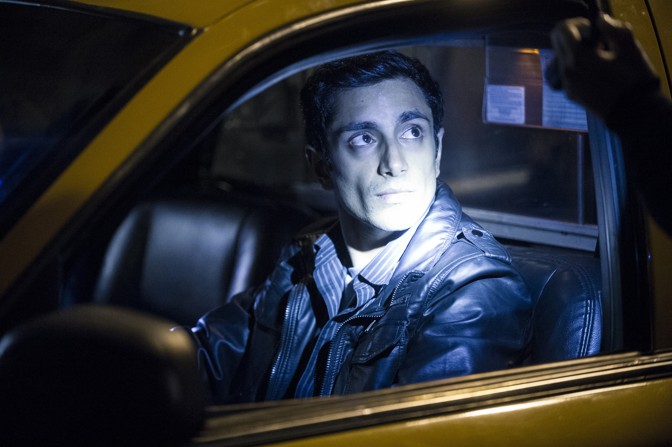
the night of
The sustaining force of this eight-part 2016 miniseries isn’t the question of what happened, exactly—why Naz (Riz Ahmed), a college student from Queens, New York, wakes up after a drug-fueled one-night stand with a stranger to find her stabbed to death in bed next to him. It’s how the criminal-justice system will transform Naz from a doe-eyed innocent in the first episode to someone capable of surviving in prison, with Ahmed’s hypnotic performance conveying all the moral and personal hardening of that evolution. The show is gorgeously shot, using color to emphasize the different environments Naz finds himself in; the vivid red of a woman’s townhouse seems to signal danger, while the bleak blues and grays of prison cells and courtrooms convey how much of Naz’s old life is bleeding away. And the extraordinary ensemble cast, including John Turturro as Naz’s attorney and Michael K. Williams as his prison protector, enhances all the story’s angles.
Watch it on: HBO
rectify
Ray McKinnon’s southern Gothic drama starts when a wrongfully convicted man, Daniel Holden (Aden Young), is released after serving 19 years on death row for the murder of his 16-year-old girlfriend. In that sense, it’s hardly a crime drama at all. The series follows Daniel’s return to life, not the snuffing out of yet another female victim, and its palette reflects this, using the natural luminosity and beauty of his Georgia hometown to convey his journey from dark back to light. Rectify doesn’t flinch when it comes to exploring what happened to Daniel in prison; the show, Laura Bogart wrote in 2016, offers one of the most nuanced portrayals of sexual assault on television. But as the series teases out its plot, it also crafts its characters—including Succession’s J. Smith-Cameron as Daniel’s mother and Abigail Spencer as his unfailingly loyal sister—with care.
Watch it on: Netflix
snowfall
The late John Singleton’s superb FX drama charts the explosion of the crack epidemic in Los Angeles during the 1980s, but it does so from the perspective of the people and forces that stoked a catastrophe. Those include Franklin (Damson Idris), a teenage dealer who spots a business opportunity, and Lucia (Emily Rios), the daughter of a Mexican gangster, who, like Franklin, has an entrepreneurial spirit and something to prove. But the series also indicts Teddy (Carter Hudson), a CIA operative whose attempts to further his career with the government end up flooding California with cocaine just as demand is surging. Singleton’s attention to detail re-creates a specific time and place with vibrant energy, while his story illustrates how power corrupts those who crave it most.
Watch it on: FX
top of the lake
Too many dramas rely on the “troubled-but-brilliant detective” trope for extra plot shenanigans (see Marcella, above) without actually doing anything meaningful with it. But Jane Campion’s seven-part miniseries, which debuted in 2013 before it was au fait for filmmakers to make the leap into TV, relies on the backstory of the detective Robin Griffin (Elisabeth Moss) to flesh out Top of the Lake’s central themes. When, in the first episode, Robin returns to the small New Zealand town she grew up in to probe the disappearance of a pregnant 12-year-old girl, the show’s central investigation seems clear. But as Robin digs into the case, and as pieces of her own past come to light, Top of the Lake reveals that its real inquiry is into misogyny and the abuse of power, and how both can thrive unchecked in isolated communities. The series spawned a strange follow-up co-starring Nicole Kidman in 2017, but the original is the one worth seeing.
Watch it on: Hulu
period crime
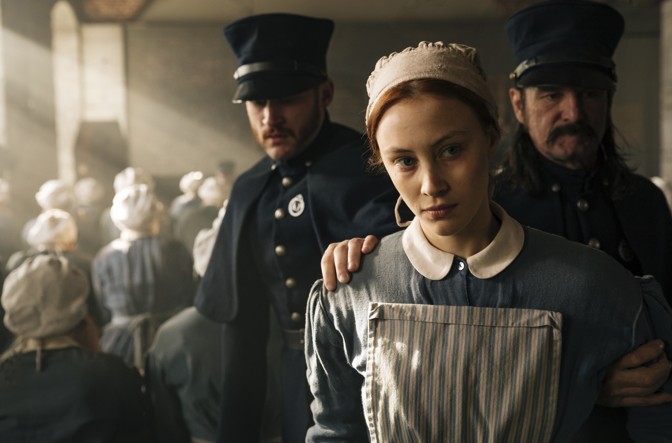
alias grace
Hulu’s The Handmaid’s Tale tends to get the lion’s share of the attention when it comes to painterly, feminist adaptations of Margaret Atwood novels. But Alias Grace, Mary Harron and Sarah Polley’s six-part miniseries from 2017, is still undersung for its riveting, ambiguous portrait of a woman accused of murder. Grace Marks (Sarah Gadon) is a notorious prisoner in 19th-century Canada who’s become an object of fascination to wealthy housewives. Wishing to prove her innocence, they recruit an American psychologist, Dr. Simon Jordan (Edward Holcroft) to assess her; this is when Grace’s story begins to unfold. Grace is astute, beguiling, and untrustworthy—the pieces of herself that she reveals to Jordan don’t always match the fragments the viewer sees in flashback. The tension between what’s hidden and what’s exposed sustains the drama, as does Gadon’s luminous, unpredictable performance.
Watch it on: Netflix
babylon berlin
One of those series perpetually feted as the best show people aren’t watching, Babylon Berlin is, variously, a Weimar-era neo-noir romp, the most expensive non-English-language series ever, and a vivacious, stylized re-creation of an unparalleled cultural moment. The Netflix titles warn briefly of “sex, nudity, substances, language, smoking,” and that’s just the beginning: There’s also a train full of missing Soviet treasure, a morphine-addicted detective who teams up with an archivist who moonlights as a sex worker, and an illicit pornography ring that’s blackmailing the mayor. The show is macabre, surreal, freighted with historical tension, and totally addictive. The demise of this seamy, glamorous, liberated world is inevitable, but watching it slowly implode is part of the fun.
Watch it on: Netflix
endeavour
You don’t have to have seen Inspector Morse, one of the most beloved and long-running detective dramas in British TV history, to appreciate Endeavour, a series that jumps back in time to the 1960s to portray the cerebral, opera-loving detective at the beginning of his career. Like Morse, Endeavour is set in Oxford, whose dreaming spires and bucolic surroundings belie its status as a hot spot for murder. There’s something Sherlockian about the young Endeavour Morse (played by Shaun Evans), whose bookish background and ability to discern clues no one else notices make him generally unpopular among his fellow constables. And the precision with which the show recreates ’60s England, including the buses on city streets and the fug of cigarette smoke in virtually every scene, makes it a visual treat too.
Watch it on: Amazon
peaky blinders
Steven Knight’s exuberant gangster epic, set in Birmingham, England, just after World War I, is always abundantly clear that the criminals, here, are the heroes, while the police are the malevolent killjoys coming to break up the fun. Cillian Murphy is intoxicatingly watchable as the brilliant, devious, oddly sympathetic crime boss Tommy Shelby, who evolves over the course of the show from a street-level crook to a member of the British Parliament as his empire expands. Peaky’s anachronistic soundtrack of Nick Cave, the White Stripes, and P. J. Harvey amps up its swagger, while the supporting cast and guest players (Helen McCrory, Sam Neill, Adrien Brody, Tom Hardy) add even more prestige to a rollicking, violent good time.
Watch it on: Netflix
globe-hopping intrigue
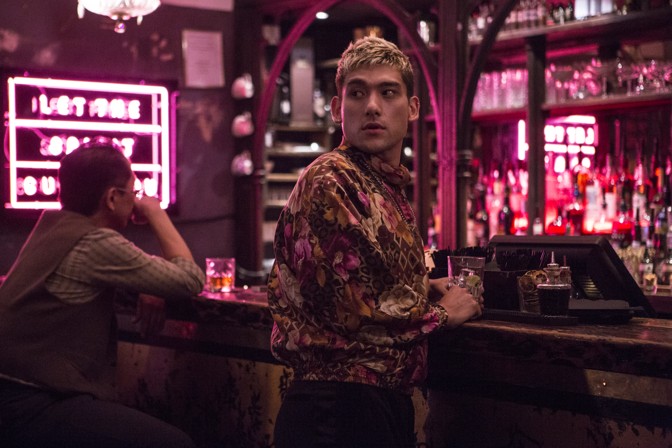
giri / haji
This BBC import arrived on Netflix in January, and doesn’t seem to have found the acclaim or the audience it deserves. After a Japanese businessman is found murdered in his London flat (those skylines again), the Tokyo detective Kenzo Mori (played by Takehiro Hira) is sent to the U.K. to investigate a case that threatens the fragile peace between Japan’s Yakuza families, and to establish how his missing brother might be involved. In London, Kenzo gathers some allies: Sarah Weitzman (Kelly Macdonald), a British detective with secrets of her own, and Rodney Yamaguchi (Will Sharpe), a feckless sex worker with violent enemies and enormous charm. Created by Joe Barton, the series is strikingly cinematic (flashbacks incorporate wide-screen, black-and-white, and even animated elements), and darkly funny. Macdonald is a preeminent actor, and Sharpe is a vibrant discovery. But Hira is most watchable, conveying Kenzo’s weariness and intelligence in equal measure, as well as his impulse to cross ethical lines to protect his family.
Watch it on: Netflix
baptiste
If grizzled, nihilistic, speak-only-in-a-whisper detectives aren’t your thing, you might want to avoid Baptiste, a spin-off of the Starz series The Missing. For everyone else, the opportunity to watch Tchéky Karyo’s French investigator, Julien Baptiste, grimace his way around a new mystery in Amsterdam is full of familiar gratification. There’s the contrast between the unimpeachable Baptiste and his sordid surroundings in the red-light district. There’s Tom Hollander (again) as an Englishman looking for his missing niece, a sex worker. And there are twists and turns and reliable cliffhangers to keep things suspenseful. The story itself can be unfailingly glum—with occasional absurd highlights—but Baptiste is a character worth relishing: a man capable of bringing philosophy to crime scenes and dour decency to his job of sifting through human frailty.
Watch it on: PBS
the night manager
John le Carré’s 1993 novel became this striking six-part BBC/AMC co-production in 2016, starring Tom Hiddleston as a luxury-hotel manager who gets embroiled in an MI6 effort to catch an international arms dealer. If TV shows can be comfort food, The Night Manager is a feast. The director Susanne Bier gives the locations the gilded menace of a Bond movie, hopping from mid-revolution Egypt to the Swiss mountains to the Monaco coast. There are yachts and palaces, toxic corruption and dangerously vulnerable women. Mostly, though, there are actors. Hiddleston is never better than when he’s playing a wolf dressed in heroic sheep’s clothing, and as Jonathan Pine, a former soldier turned unflappable concierge, his dark side festers under immaculate tailoring. Olivia Colman plays his handler, Angela, a woman whose utter competence the show relies on to patch the occasional plot hole. As the debonair war criminal Richard Roper, Hugh Laurie is delightfully amoral while exuding undertones of real cruelty. And the supporting actors alone could carry a Game of Thrones spin-off: Tobias Menzies, Elizabeth Debicki, Tom Hollander, David Harewood, and Alistair Petrie among them.
Watch in on: Amazon
zerozerozero
If the concept of exploring the intricate global impact of organized crime isn’t entirely novel, there’s still something bracing about the ambition of ZeroZeroZero. The eight-part series is a deep dive into the families, mob bosses, and corrupt cops involved in moving a shipment of cocaine from a Mexican port to an Italian town. Stefano Sollima (Sicario: Day of the Soldado, Gomorrah) gives an auteurish crackle to the landscapes he captures that makes ZeroZeroZero feel more like a movie than a series. While a brisker pace would have lifted it into abject excellence, there’s still so much happening that it’s hard not to be transported. In one arc of the show, Gabriel Byrne plays a New Orleans shipping magnate plagued by the changing economics of his field. (Andrea Riseborough is particularly watchable as his daughter, a woman trying to assert herself in a virulently patriarchal environment.) In another, a senescent Italian mafioso (Adriano Chiaramida) is schemed against by his violent, iconoclastic grandson. And in Mexico, a team of soldiers tries to use the cartel’s own ruthless tactics against them.
Watch it on: Amazon
Cult Australian comedy 'Danger 5' resurrected as an Audible podcast
Valve's Project Proton has Brought Over 6,500 Windows Games to Linux
This is an amazing achievement for the Linux gaming community and outshines the work of any porting company, at the current rate over 100 games are gaining complete compatibility each month and the average quality of games has also increased. Out of the top 1000 Steam games 67% run perfectly after minor tweaks.
22 Movies About the End of the World to Watch Now
A global crisis might seem like the worst time to watch movies about the end of the world. The apocalyptic genre has boomed in cinema since the start of the Cold War, and plenty of classics have set the template for what a ruined, dystopian future might look like. Think of the barren wastelands of Mad Max, the emptied-out cities of The Omega Man, the zombie-overridden Dawn of the Dead, and other classics such as Escape From New York, 28 Days Later, Children of Men, and WALL-E.
But what I’ve always loved about the genre is how it also radically envisions new societies and imagines the best of people, highlighting humanity’s resilience in the toughest circumstances. Postapocalyptic movies are filled with memorable heroes and striking landscapes, and they can offer fascinating insights into life as we know it by conjuring up entirely different modes of existence. Here are some of my favorites, including romantic comedies, sci-fi masterpieces, horror hits, and quiet dramas. Some of my picks fit neatly into the “end of the world” category, and while other selections might be surprising, they’re no less resonant. All are available to watch online.
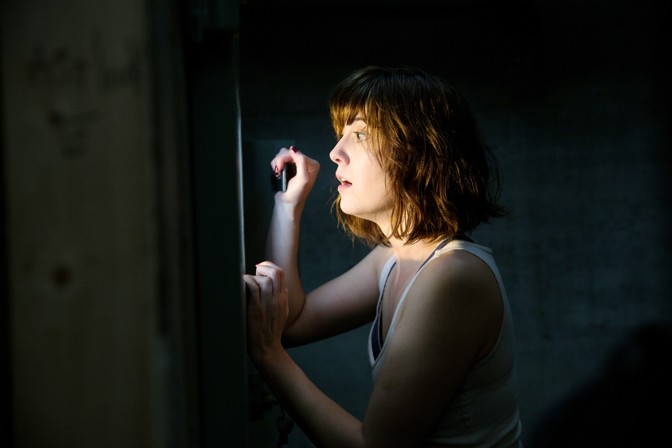
10 Cloverfield Lane (2016, directed by Dan Trachtenberg)
Originally titled The Cellar, this taut thriller was branded as a spiritual sequel to the 2008 disaster film Cloverfield. But while its forebear portrayed outright destruction, with a monster leveling New York City, 10 Cloverfield Lane is an even better presentation of an apocalyptic mindset. Set in a fallout bunker, it’s about a battle of wills between Howard (played by John Goodman), a survivalist who insists that the city outside has been destroyed, and Michelle (Mary Elizabeth Winstead), a young woman who worries that he’s invented the whole scenario to keep her captive. The ensuing drama encapsulates both the cabin fever and paranoia that can come from living in lockdown.
How to watch: Rent from various outlets
12 Monkeys (1995, directed by Terry Gilliam)
Terry Gilliam has provided multiple visions of humanity’s future, from the baroque dystopia of Brazil to the dreamy fantasia of The Zero Theorem. My favorite remains 12 Monkeys, a grim and glorious blockbuster adaptation of Chris Marker’s short film La Jetée. The 21st-century Earth of 12 Monkeys was destroyed by a weaponized virus, which James Cole (Bruce Willis) must go back in time to prevent. Some of the film’s best shots are of Philadelphia circa 2035, free of people and covered in snow, with wild animals roaming around while humans try to survive underground. Gilliam can find beauty in the most haunting imagery, and 12 Monkeys is packed with frames that simultaneously horrify and delight.
How to watch: Stream on Showtime
A.I. Artificial Intelligence (2001, directed by Steven Spielberg)
From the outset, the futuristic world of A.I.—Steven Spielberg’s ambitious adaptation of a long-gestating Stanley Kubrick project—has already weathered catastrophe. Major cities are flooded and civilization is overrun by dilapidated “mechas,” a robot underclass built to serve a dwindling human race. But the film is most striking in its last act, which jumps millennia ahead to depict an Earth populated only by artificial beings that still cherish their extinct creators. The story line follows the robot child David (Haley Joel Osment) on a Pinocchio-inspired quest to become flesh and blood. Though the fairy-tale setup turned off many critics, it’s just gauzy wrapping for a dark fable that presents the ability to love as humanity’s greatest strength and weakness.
How to watch: Stream on Prime Video and Pluto TV
Avatar (2009, directed by James Cameron)
Earth is barely glimpsed in Avatar, but the prologue to James Cameron’s sci-fi epic hints at tragic conditions: The planet’s resources have been drained and its lands scoured by warring private contractors. The distant moon of Pandora is an unspoiled paradise, a Day-Glo mix of floating mountains and dense forests inhabited by lithe aliens that exist in concert with nature. So what do humans do when they arrive? Conquer, pillage, and blow things up, making the same mistakes that doomed them to search for new lands in the first place. Cameron’s blockbuster allegory isn’t subtle—his films rarely are—but it is pointed, and despite making America the explicit bad guy, Avatar became the nation’s biggest box-office hit of all time.
How to watch: Stream on Disney+
Blast from the Past (1999, directed by Hugh Wilson)
This bunker movie is an explicit comedy: After a 1960s family’s nuclear fears lead them to hunker down for 35 years, they emerge in 1999 and are bewildered by how much things have changed. Blast From the Past is one of the more underrated rom-coms of the ’90s, casting the square-jawed Brendan Fraser as Adam, a man out of time who falls for a modern gal, Eve (Alicia Silverstone). Christopher Walken and Sissy Spacek give appropriately odd performances as Adam’s frozen-in-time parents. Amid the fish-out-of-water humor is a look back at an earlier era of American paranoia, one papered over with chipper pieces of pop culture such as I Love Lucy.
How to watch: Stream on the Roku Channel
The Day the Earth Caught Fire (1961, directed by Val Guest)
Apocalyptic movies proliferated after World War II, with the atomic age and the Cold War fueling decades of dystopian fiction about what could happen next. One of the cleverest, soberest examples of the genre is this under-seen British classic, in which a rash of nuclear testing causes the planet to heat uncontrollably. Val Guest finds innovative ways to depict the horror, with orange-tinged lighting and matte paintings of abandoned cities. But the film stands out because it’s set mostly in the offices of a London newspaper, where a group of reporters attempts to make sense of its collapsing circumstances.
How to watch: Rent from various outlets
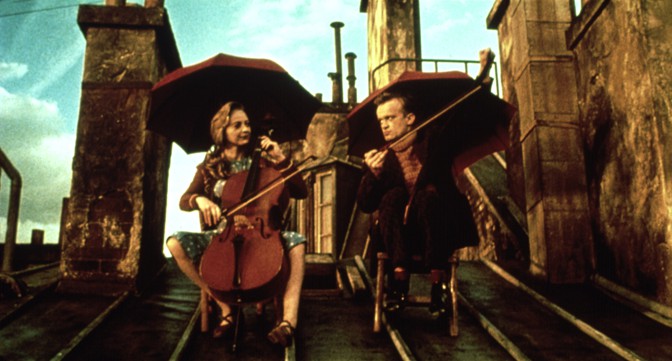
Delicatessen (1991, directed by Marc Caro & Jean-Pierre Jeunet)
A breakout debut for its French directors, Delicatessen laid out an aesthetic that would dominate movie design throughout the ’90s, a steampunk future with a ramshackle DIY quality to its technology. What happened to the outside world, which viewers see as a sulfurous wasteland, isn’t explained; the action is confined to a crumbling apartment building, where a cruel landlord butchers his tenants to sell as meat. Delicatessen is anarchic, violent, and bizarre, but it also contains an achingly cute romance between the landlord’s daughter (Marie-Laure Dougnac) and his next victim (Dominique Pinon). It’s an eschatological comedy that acknowledges how brutality and optimism can thrive side by side.
How to watch: Stream on the Criterion Channel and Prime Video
High Life (2018, directed by Claire Denis)
Though Claire Denis’ latest movie has a sci-fi setting, the French director has called it a prison film, given that its characters are mostly inmates sentenced to a future of hard labor on an interstellar spaceship. High Life follows Monte (Robert Pattinson), a convict who becomes the last survivor of a mission to explore a black hole. The film is primarily concerned with how he’s managed to retain his humanity and empathy, both in space and on the bleak, industrial-looking Earth he came from. High Life is an alienating experience, but it’s one of Denis’ best works, a vision of an even more stratified future built on the backs of the most vulnerable.
How to watch: Stream on Prime Video
Interstellar (2014, dir. Christopher Nolan)
To depict the end of the world, Christopher Nolan reached into history, creating a futuristic version of the Dust Bowl and using footage from Ken Burns’s documentary about the disaster to explain it. Interstellar is loaded with jarring visual touches, including a cornfield incongruously surrounded by mountains and the New York Yankees playing in a high-school baseball stadium. Though much of the action is set in space, Nolan takes time to build out the parameters of his struggling Earth. The director tells an apocalypse story that’s centered on the family of the astronaut Cooper (Matthew McConaughey), thus investing the audience in Cooper’s mission to pull humans back from the brink of extinction.
How to watch: Stream on FX
Oblivion (2013, directed by Joseph Kosinski)
Visual-effects technology had advanced enough by 2013 that Oblivion could delight in portraying an empty Earth, with scenes of a high-tech janitor (Tom Cruise) zooming around famous landmarks on a planet abandoned after an intergalactic war. Joseph Kosinski (who also made Tron: Legacy and the upcoming Top Gun: Maverick) excels at visual tableaux, and Oblivion unfurls its dramatic landscapes with aplomb. Though the twists of Oblivion’s sci-fi story are routine, the aesthetics of Kosinski’s sparse future, in which every piece of technology looks like it rolled off the Apple assembly line, are eerily resonant.
How to watch: Rent from various outlets
Princess Mononoke (1997, directed by Hayao Miyazaki)
Though Hayao Miyazaki’s dark fantasy film is set hundreds of years ago, during Japan’s Muromachi period, this environmental epic has a sharp message about humanity’s doomed present and future. Many of Miyazaki’s movies obliquely explore how industrialism and pollution throw the natural world out of balance; Princess Mononoke charges directly at that conflict, following the fantastical disruptions that ensue when humans build a settlement in a mystical forest. The spirits that emerge to battle the humans are among Miyazaki’s most transfixing. Equally crucial is the sympathy he extends to his apparent villain, Lady Eboshi—a rigid and protective ruler whose need to expand her territory is depicted with nuance rather than simplistic malevolence.
How to watch: Buy from various outlets; stream on HBO Max (forthcoming)
The Quiet Earth (1995, directed by Geoff Murphy)
A criminally under-seen classic from New Zealand’s 1980s boom of exciting and original cinema, The Quiet Earth has a familiar setup: A man (Bruno Lawrence) wakes up alone on a seemingly deserted Earth. Though some of the plot sees him trying to unravel the mystery of what happened to the planet, the film is more concerned with the fragile mental state of its protagonist as he navigates his new, lonely existence. It’s the best work by Geoff Murphy, who examined life in New Zealand from many challenging angles before being lured to Hollywood to make mediocre blockbusters.
How to watch: Stream on Kanopy and Hoopla
Safe (1995, directed by Todd Haynes)
The apocalypse in Safe is an entirely personal one: Carol White (Julianne Moore), a suburban housewife, is besieged by a variety of inexplicable illnesses and allergies, and struggles to convince others of the seriousness of her condition. Todd Haynes’s film is a deeply allegorical tale of the precariousness of life at the height of the HIV/AIDS epidemic, but its themes are worryingly applicable today. Haynes and Moore communicate the paranoia that each new symptom provokes in Carol, and show how her efforts to self-quarantine begin to degrade her mental health. Safe isn’t a film with easy answers, but therein lies much of its power.
How to watch: Stream on the Criterion Channel
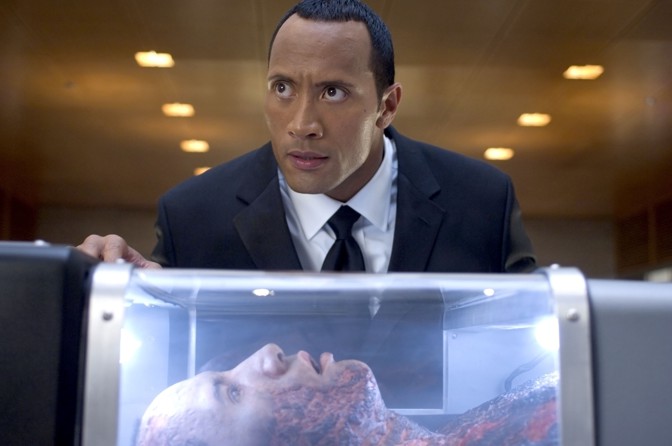
Southland Tales (2006, directed by Richard Kelly)
Following his 2001 cult hit, Donnie Darko, the writer and director Richard Kelly crafted this gonzo epic, a dense and often wildly funny portrait of a near-future America on the brink of destruction. Attempting to summarize the plot of Southland Tales is a fool’s errand—the film itself struggles to explain everything, and Kelly planned multiple graphic novels to lay out its extended back story. But his visions of a government surveilling its citizens, Hollywood movie stars (played by Dwayne Johnson and Sarah Michelle Gellar) becoming the leaders of a Marxist revolution, and a never-ending War on Terror driving the country into madness all feel oddly prescient.
How to watch: Stream on Mubi
Stalker (1979, directed by Andrei Tarkovsky)
Maybe the most influential work of apocalyptic cinema is Andrei Tarkovsky’s sci-fi masterpiece, which harnesses the deserted landscapes surrounding abandoned Soviet power and chemical plants to imagine an ominous future. Much of the action is confined to “the Zone,” an empty part of the world where the laws of reality do not apply; the story follows a writer and a professor trying to navigate this region with the help of the Stalker (Alexander Kaidanovsky). The polluted areas where Tarkovsky filmed look alien and forbidding, perfectly mirroring Stalker’s inscrutable plot.
How to watch: Stream on the Criterion Channel and Kanopy
Star Trek: First Contact (1996, directed by Jonathan Frakes)
The universe of Star Trek’s many television shows is a utopia where the citizens of Earth have dispensed with such petty concerns as poverty and global conflict. But that society emerged only after a nuclear war ravaged the planet. Star Trek: First Contact transports the crew of the Enterprise back in time to the brink of civilization’s collapse to do battle with the alien Borg. It’s one of the best editions in the Trek film franchise because of both its compelling action and its high stakes—Jean-Luc Picard (Patrick Stewart) and his crew are fighting to ensure a future that’s anything but apocalyptic.
How to watch: Stream on Hoopla and Popcornflix
Synecdoche, New York (2008, directed by Charlie Kaufman)
Charlie Kaufman’s directorial debut is ostensibly about an art project that gets out of hand when the theater director Caden Cotard (Philip Seymour Hoffman) uses a MacArthur Fellowship to stage a play that encompasses all of human experience. Set in a giant Manhattan warehouse, the film follows Caden’s efforts to mimic reality as best he can, first dramatizing his own life, then casting actors to play the actors shadowing him and his family, and so on, until his production has become a fully functional city unto itself. Synecdoche, New York is bubbling over with so many philosophical themes and implications that it alienated some audiences when it was first released. One of its most fascinating insights, though, is how humanity—much like a virus—replicates itself in unpredictable ways, eventually turning a quiet domestic drama into a much larger crisis.
How to watch: Stream on Pluto TV
Time of the Wolf (2003, directed by Michael Haneke)
Michael Haneke, the Austrian master of hostility and despair, has made many films (such as Funny Games, The Seventh Continent, and The White Ribbon) that reflect the disintegration of society. But his only explicitly futuristic work is Time of the Wolf, a chilling drama set after some unspecified global disaster. It follows a family (headed by Isabelle Huppert) fleeing the city and finding their country cottage occupied by strangers; from there, further horrors descend, always rendered with the dreadful mundanity that is Haneke’s specialty. The film’s most effective scares are some of the simplest, using nighttime photography to increase the sense of ongoing menace.
How to watch: Stream on Mubi on Amazon
The Truman Show (1998, directed by Peter Weir)
The world of The Truman Show is anything but apocalyptic: It’s an idyllic seaside community where everything functions like clockwork and the residents’ biggest anxieties are about what to eat for dinner each night. But that’s what’s so wonderfully creepy about The Truman Show, a sci-fi vision of reality television that satirizes America’s pompous postwar exceptionalism. Truman Burbank (Jim Carrey) is the star of a TV show he doesn’t know exists, living inside an artificial bubble created only for him. (As an announcer proudly proclaims, Truman was the first child ever adopted by a corporation.) Even though Truman’s scripted life seems perfect, Peter Weir uses its cookie-cutter conformity to illustrate a disturbing world frozen in time.
How to watch: Stream on Starz and DirecTV
Us (2019, directed by Jordan Peele)
The implausibility of Jordan Peele’s wonderful horror film was a sticking point for some critics on release, but that’s part of its elaborate surrealism. In Us, the real apocalypse happened long ago, but Americans either don’t know about it or refuse to think about it. Meanwhile, people’s “tethered” doubles, the results of a failed government experiment, live dreary mirror lives underground. The metaphor is broad enough to encompass any injustice people try to ignore from day to day, be it poverty, homelessness, or racial inequality. The film’s plot, which sees the Tethered emerging to overthrow the social order, is equal parts terrifying and funny. In other words, it’s perfectly within Peele’s wheelhouse.
How to watch: Stream on HBO Now and DirecTV
Vanilla Sky (2001, directed by Cameron Crowe)
The most memorable shot in Cameron Crowe’s remake of the Spanish film Open Your Eyes—Tom Cruise running through an empty Times Square—was accomplished through a feat of scheduling. Now, as Manhattan remains mostly devoid of people, the film feels resonant, not only for imagining an abandoned New York, but also for satirizing how far people will go to return to normalcy after a trauma. Summarizing Vanilla Sky is tough, but the gist is that the millionaire publishing playboy David Aames (Cruise) is injured in a car accident and resorts to a strange, dream-based form of sci-fi therapy to eliminate his scars. Crowe’s film is bizarre and ambitious, but its best sequences—such as David’s journey through a vacant metropolis—are its most nightmarish ones.
How to watch: Stream on Starz on Amazon
The Village (2004, directed by M. Night Shyamalan)
The Village might be M. Night Shyamalan’s best and most complete piece of storytelling: a parable of what happens when a community tries to seal itself away from hardship. Set in a rustic town that’s cut off from the outside world and surrounded by red-cloaked monsters, The Village is mostly a portrait of the comfort and terror that come with voluntary isolation; it explores America’s post-9/11 mindset by telling a story of a town that seeks only the illusion of safety at the cost of every other liberty. Shyamalan’s reputation for twist endings somewhat overhyped the movie’s initial rollout, since audiences went in with high expectations for a surprise finale. But while the big reveal in The Village was initially mocked, it makes tragic thematic sense, and only deepens the viewing experience on rewatch.
How to watch: Rent from various outlets
10 Perfect Films to Watch While Stuck at Home
As the days spent in social isolation drag on, the utility of all the subscription-based streaming services available online and through your TV only grows—and so does the difficulty of deciding how to use them. If you, like me, are having trouble figuring out what to watch during these overwhelming times, I’m here to help. There are troves of great films available on every app, even if some of them are buried by algorithms that hide them from the front page. Here are some choice options to match a variety of sheltering-in-place moods, available on Netflix, Hulu, HBO Now, or the Criterion Channel.
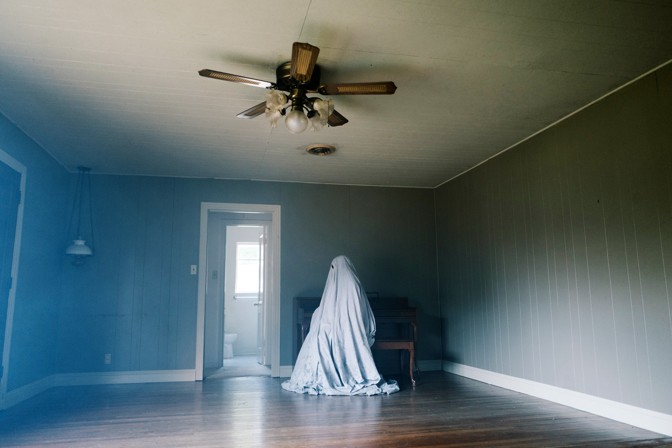
If you’re feeling trapped at home: A Ghost Story
The protagonist of David Lowery’s meditative tale of love and loss is an unnamed man (played by Casey Affleck) who is killed in a car accident and begins to haunt his own house, wearing a white sheet and solemnly watching his wife (Rooney Mara) until she moves out. Since he’s tied to the building, the movie becomes a strange fairy tale about watching as things change, powerless to stop them. That may sound harrowing, but the film revels in the beauty of the passage of time as well as the tragedy, and has a great (if inadvertent) depiction of social distancing. (Netflix)
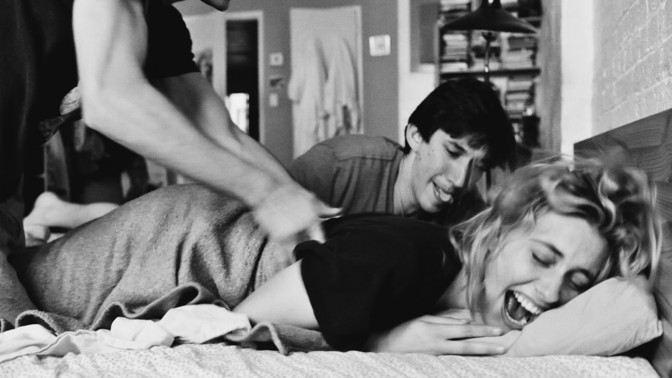
If you’re feeling nostalgic for human connection in the city: Frances Ha
Noah Baumbach and Greta Gerwig’s effervescent collaboration (he directed; she stars; they wrote together) might be the best movie in both of their storied careers. Following a 27-year-old dancer (Gerwig) trying to scrape out a life in New York, it perfectly captures the intense need for close friendship that people have in their post-college lives, and the pain and joy that comes with that. It’s also a terrific snapshot of New York in the early 2010s that will provide a bit of comfort for anyone missing the city’s busy streets. (Criterion Channel, Netflix)
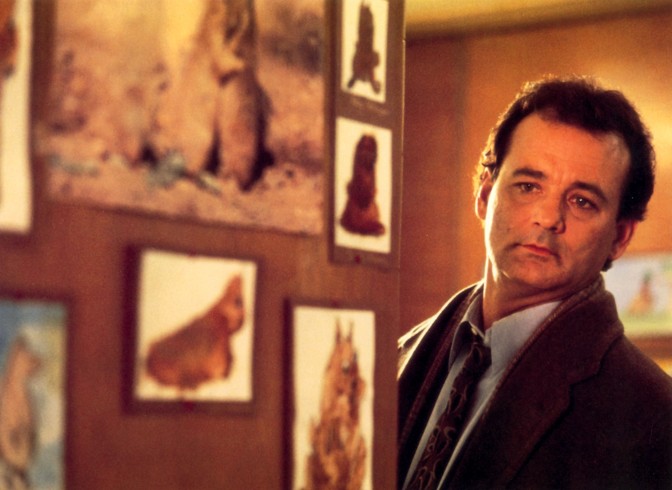
If you feel like you’re living the same day over and over: Groundhog Day
An obvious choice, perhaps, but no wonder—Harold Ramis’s film is one of the most reliable and delightful pieces of entertainment in Hollywood history. The plot’s template has been much-copied over the years: Bill Murray’s misanthropic newsman travels to a quaint town and gets stuck endlessly reliving the second of February, unable to break out of the loop. It’s not only a wonderful romantic comedy, but also a slyly spiritual tale, a parable of self-improvement that never feels preachy and that reveals more depth on every viewing. (Netflix)
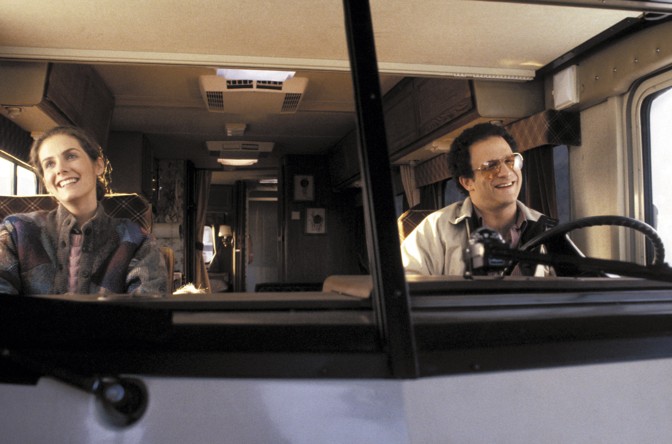
If you’re fantasizing about going on the road: Lost in America
Albert Brooks’s 1985 satire of an upper-middle-class couple buying an RV and trying to shed their bourgeois trappings is just as biting as it was upon release. Most of all, it’s an object lesson in looking before you leap—sure, the open highways and the great unknown might seem tempting, but even with a fully loaded Winnebago, problems will spring up sooner than you think. (HBO Now, Hulu)
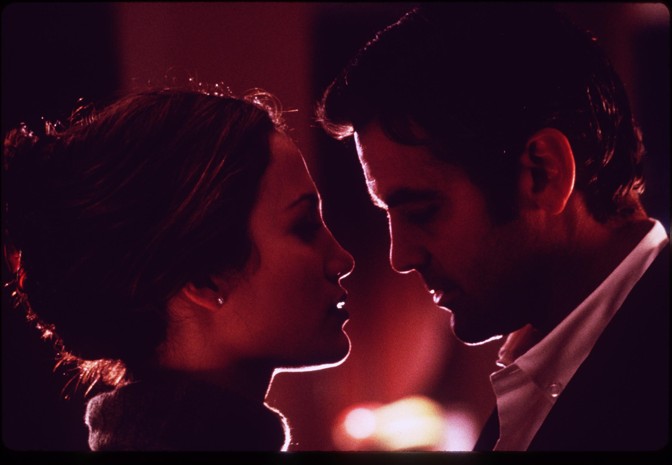
If you want to luxuriate in movie-star charm: Out of Sight
Steven Soderbergh’s sizzling neo-noir has long been one of my go-to films for summoning a good mood. Though it’s an expertly made work with a sharply funny screenplay, its real magic comes from its fantastic central couple, played by George Clooney and Jennifer Lopez. Both are early in their careers, but they already sparkle with superstar appeal, particularly in what might be the best love scene ever filmed. (HBO Now, Hulu)
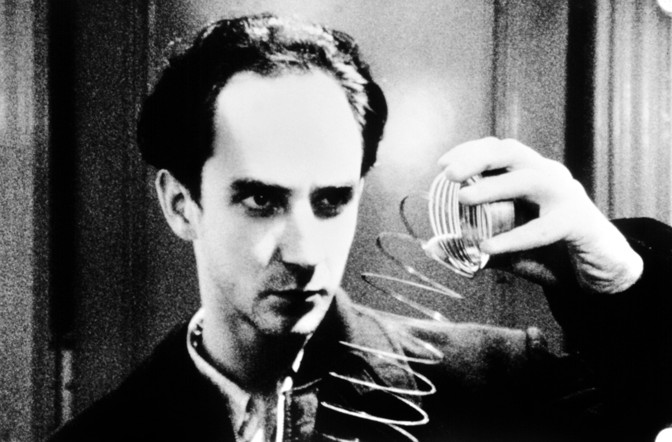
If you’re looking to indulge your paranoia: Pi
Darren Aronofsky’s debut thriller was made in 1998 for $60,000, featured a cast of total unknowns, and focused on mental illness, mysticism, and math. Even so, it became a cult hit because of Aronofsky’s deft but surreal storytelling. It’s a great portrayal of cabin fever, starring Sean Gullette as a shut-in who is either going slowly insane or has found a mathematical way to predict the future and communicate with God. Or both. (Hulu)

If you’re looking for something meditative and satisfying: Jiro Dreams of Sushi
David Gelb’s 2011 documentary about the Japanese master chef Jiro Ono perfects many of the visual tropes that cooking documentaries rely on—montages of food being delicately assembled to orchestral music, and lush close-ups of individual meals. That this imagery is now ubiquitous doesn’t make it any less watchable, and the serenity of Jiro’s approach to sushi versus the bluntness of his relationship with his children remains totally transfixing to watch. As a bonus, Netflix is also currently streaming Documentary Now!’s perfect send-up of Jiro, an episode titled “Juan Likes Rice and Chicken.” (Hulu, Netflix)
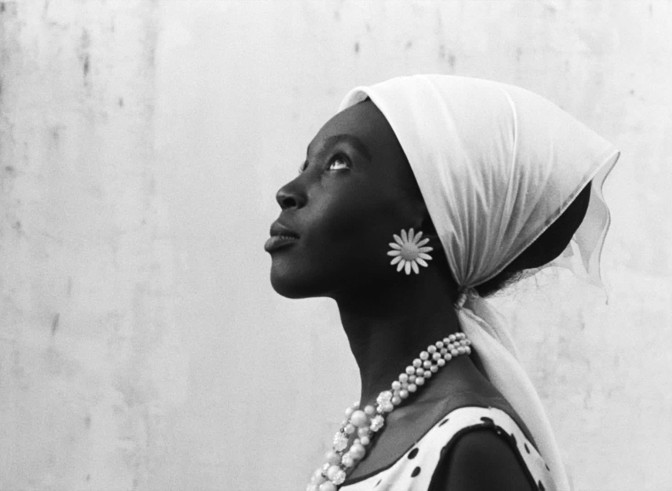
If you’re looking to broaden your horizons: Martin Scorsese’s World Cinema Project
Though Scorsese is a master of cinema in his own right, one of his most significant contributions to the medium is his film foundation, which restores and preserves some of the world’s best movies in order to bring them to a wider audience. Criterion currently has 17 of these from countries such as Senegal, Thailand, Turkey, Brazil, and Cuba, all gathered in one neat package. The service also has many other collections worth browsing, including retrospectives of the acting careers of such legends as Burt Lancaster, Wendy Hiller, and Max von Sydow, with more cycling in all the time. (Criterion Channel)
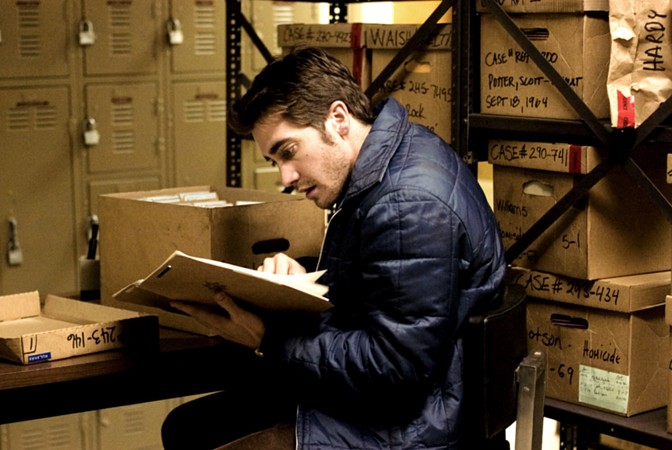
If you want to settle in for a long watch of one of the best movies of the century: Zodiac
David Fincher’s greatest film is two hours and 37 minutes long and better than any true-crime documentary. Its narrative of the Zodiac Killer’s crimes becomes a reckoning with America’s never-ending obsession with murder, and with the even more intoxicating fallacy that every problem—no matter how frightening or obscure—can be solved. Zodiac is always worth watching, but right now, it offers a cautionary tale of a government and its private citizens haphazardly coming together in a time of crisis. (Netflix)
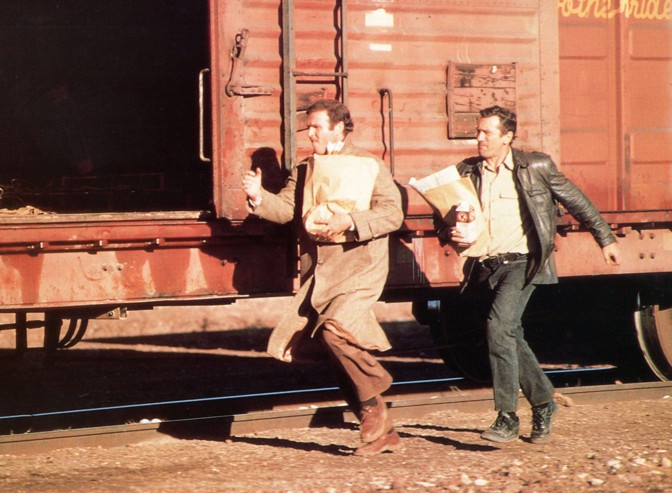
If you just want to laugh: Midnight Run
Martin Brest’s 1988 buddy comedy, starring Robert De Niro as an irascible bounty hunter and Charles Grodin as his curmudgeonly quarry, is, in my opinion, the most watchable film ever made. I defy you to turn on Midnight Run for even 30 seconds without getting instantly sucked in. Every scene is funny, the humor is never overplayed, and the lead actors unlock performances from one another that you might have thought impossible. If self-quarantining is getting you down, I recommend 126 minutes of Midnight Run, stat. (Hulu)
Escape From Quarantine With a Western Movie
Almost every second of action in Howard Hawks’s 1948 film Red River, one of Hollywood’s greatest Westerns, takes place outside. An epic account of a 1,000-mile cattle drive from Texas to Kansas, the movie follows the rancher Thomas Dunson (played by John Wayne) and his protégé, Matthew Garth (Montgomery Clift), as they move their cows north on a perilous march. When their journey comes to an end, Garth walks into a building and looks up in astonishment. “A roof is funny,” he muses. “We haven’t been under one in three months.”
I had put on Red River, which is available to stream on the Criterion Channel, out of a vague desire to watch a classic Western. Clift’s line perfectly summed up what I was seeking: the least claustrophobic movie possible, one with sweeping vistas and a potent sense of danger and adventure. Over the past week, I’ve been devouring one of the American film industry’s oldest genres, both familiar standards and later revisionist masterpieces, because Westerns offer pure cinematic escapism—from our hermetic homes to landscapes that are wild, exposed, and boundless.
[Read: A quick guide to streaming movies while in quarantine]
Westerns have been around as long as Hollywood itself, so there are many eras to dig into if you’re in need of something to watch while isolating. For me, much of the broader appeal of the genre at the moment is aesthetic: Westerns revolve so much around the outdoors that the simple act of going inside is worth remarking on. Red River is a Moby Dick–esque fable of the extreme mentality required on the American frontier, with Dunson cast as an Ahab-like antihero pushing his men beyond their limits to achieve his goals. But it’s also just a nice movie about taking a really, really long walk outside. What could be more soothing?
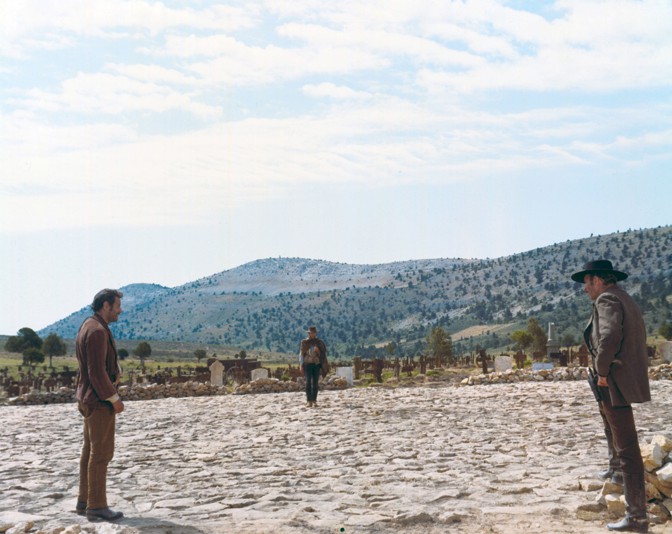
Beyond Red River, many other classics of the genre are available on Criterion’s streaming service. Delmer Daves’s 1957 nail-biter, 3:10 to Yuma, is less about majestic visuals and more about the tense interplay between its two leads, Glenn Ford and Van Heflin, but it still thrives on the remoteness of its Arizona setting. John Ford’s Oscar-winning Stagecoach, which helped launch Wayne’s career as a square-jawed everyman, is another gripping narrative of traveling through hostile territory. Like so many of these older films, it also relies on depictions of Native Americans as savages.
Such binary notions of heroes and villains have been baked into the genre from the beginning, whether via arcs about do-gooding farmers standing up to amoral bandits or plots about “cowboys versus Indians.” In most classic Westerns, Native Americans are a faceless evil, a racist symbol devoid of deeper characterization. Such simplistic storytelling pervades the genre beyond its frequent use of stereotypes. Red River, though a canonical work, is notorious for its sappy conclusion, when Dunson and Garth’s bitter rivalry is healed by a character forcing them at gunpoint to reflect on their love for each other. This resolution is far too tidy, but in this time of extreme uncertainty, I’ve found myself appreciating stories with unambiguous finales.
[Read: Hollywood is facing an existential crisis]
If you grow tired of the black-and-white moralism of Hollywood’s Golden Age, look to later decades, as the classic Western fell out of style and new films sought out complexity. Two of Sergio Leone’s spaghetti Westerns—The Good, the Bad and the Ugly and Once Upon a Time in the West—are now streaming on Amazon Prime (the latter is also on Netflix). Filmed in Italy in the 1960s, they have some of the most gorgeous photography in cinema history. Clint Eastwood’s extensive oeuvre as a director is always worth checking out too, including The Outlaw Josey Wales, Pale Rider, and his Best Picture–winning opus Unforgiven; as a filmmaker, he excels at casting a cynical eye toward the frontier supermen he once played.
There are plenty of recent favorites you might have seen in theaters, movies that’ll satisfy the need for mesmerizing panoramas and conjure an experience that many have grown nostalgic for—going to the cinema. Think of films such as Kevin Costner’s Open Range, a painterly tale of cowboys standing up to land barons, or John Maclean’s highly underrated Slow West, a stunning and tragicomic subversion of the genre’s alpha-male heroism.
As people spend more time indoors, they might notice their attention spans growing shorter. The constant stream of news can make it difficult to focus on anything for too long. For me, dipping into Westerns has helped lend some structure to my viewing diet, but its main therapeutic power for anyone lies in opening a window to a world far removed from our own. Perhaps the next genre I’ll venture into will be space movies—where the visual storytelling is that much more otherworldly. But because interstellar exploration requires many enclosed spaces, for now I’ll feel happy roaming a more earthbound fantasy land: the great American outdoors.
here are more Westerns you can stream today:
on Netflix
Wyatt Earp (1994)
True Grit (1969)
Hell or High Water (2016)
on Hulu
Meek’s Cutoff (2011)
The Sisters Brothers (2018)
The Revenant (2015)
on Prime Video
The Man Who Shot Liberty Valance (1962)
The Magnificent Seven (1960)
'Star Trek: Voyager' gets an unofficial 4K remaster thanks to AI
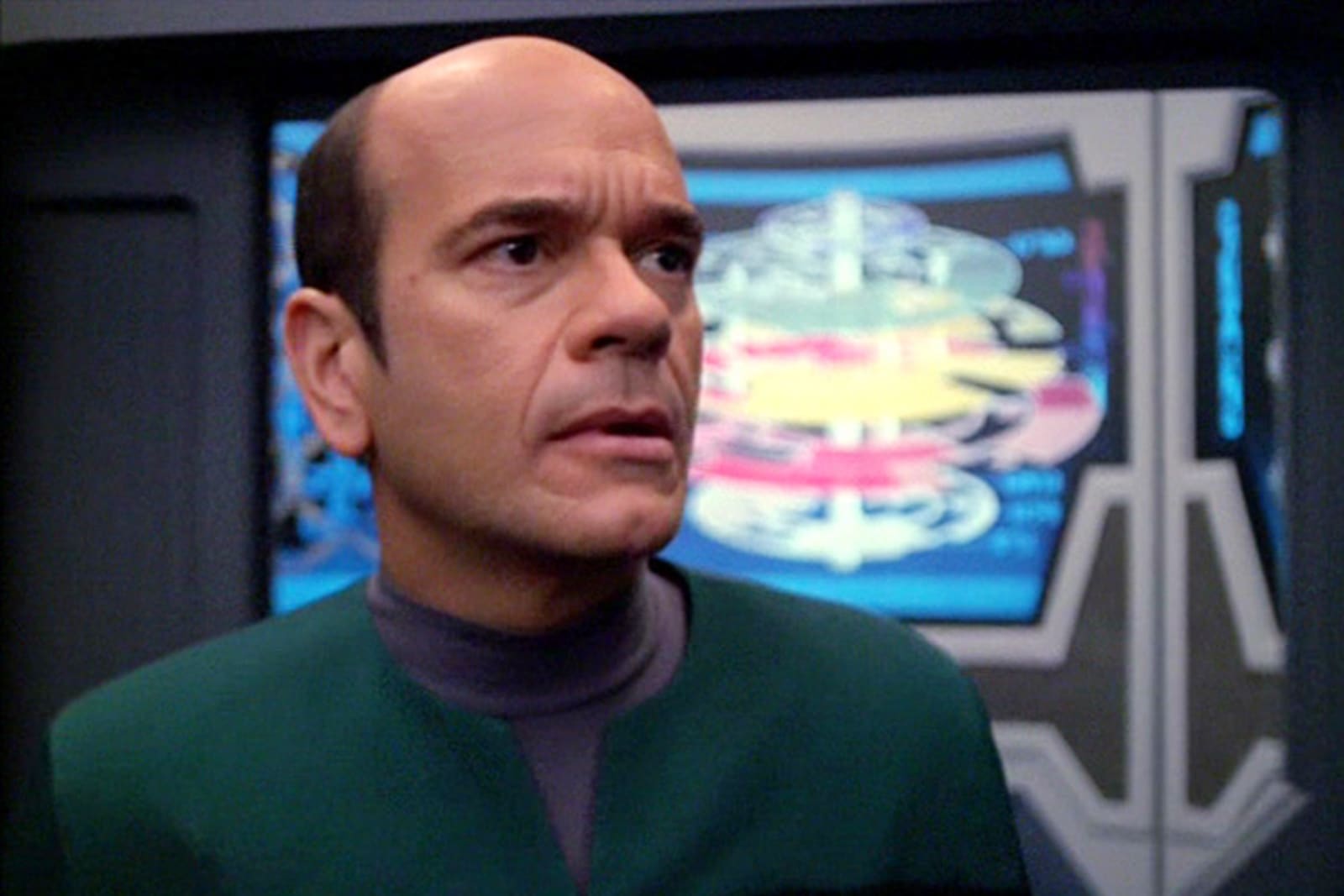 As with Deep Space Nine, Star Trek: Voyager is unlikely to ever get an official high-resolution remaster. The effects were shot on video rather than added to film after the fact, making it much harder to upgrade the quality than it was for The Next...
As with Deep Space Nine, Star Trek: Voyager is unlikely to ever get an official high-resolution remaster. The effects were shot on video rather than added to film after the fact, making it much harder to upgrade the quality than it was for The Next...
Springtime for Introverts
I am not usually one to see a glass as half full, especially when any idiot can see that it’s half empty, as it is right now. But the new quarantine regime that is forcing even the most outgoing person indoors does, to combine metaphors, gild the glass with a silver lining: It has relieved considerable pressure on the introvert community. The world has caught up with us at last.
I should point out, to strike a personal note, that I live alone; already I can hear you say to yourself, “There’s a big surprise.” When newscasters tell Americans that we are entering a “strange new way of life” or a “new normal,” or moving into “unfamiliar territory,” I know they’re not talking to me. I and millions like me have been trying to self-isolate for years. We are the hopeful practitioners of antisocial distancing.
[Read: The dos and don’ts of social distancing]
That February was the virus’s American debut is fitting, because many introverts were still recovering from the trauma of the end-of-year holidays: Thanksgiving, Christmas, Hanukkah, New Year’s. (Introverts recover slowly.) Each year from late November to early January, we are subjected to a period of unrelenting cheerfulness, with entreaties from our extrovert brothers and sisters to join the fun, come out of our shell, loosen up, party down, stop being such a fuddy-duddy.
Well, there is no party to join now, and if there were a party and the host, by definition an extrovert, was popular enough to attract more than nine guests, it would quickly be declared a public menace. All our lives, introverts have known there was something wrong with large parties. We just couldn’t quite put our finger on what it was, and even if we could, we would have probably kept it to ourselves. We now look prescient rather than merely neurotic.
Assuming, that is, people look at us at all. We usually go unnoticed by design. We are the people who spent the night of our senior prom working on an arts-and-crafts project, who whiled away weekends burrowed in the stacks at the college library, who later on preferred to eat alone at corner tables in restaurants with a book propped up on the salt shaker, ignoring the occasional puzzled or pitying glances from the extroverts at the bar.
[Read: All the cozy things keep me going]
Replace the restaurant corner table with a tub of takeout, eaten over the sink standing up, and you can see how everyone else’s new normal conforms to our old normal. I have never known an introvert who washed his or her hands fewer than a dozen times a day; it’s our version of calisthenics. Hugs, long a source of terror for us, are now generally understood to be as violent and unwelcome as decapitation. The elbow bump is a social greeting most introverts can live with, far superior anyway to the viral autobahn of the handshake. A brief, awkward wave at six paces would be best of all. Indeed, for a true introvert, any encounter closer than six feet constitutes foreplay.
Only recently has introversion been deemed a social force, thanks to the writer Susan Cain. She became an unofficial spokesperson, a very soft-spoken spokesperson, when she published Quiet: The Power of Introverts in a World That Can’t Stop Talking a few years ago. As nonleader of a nonmovement, Cain replaced the late writer and memoirist Florence King, author of Confessions of a Failed Southern Lady. So deep was Florence’s introversion, she once told me, she had recently bought a used car on the condition that the seller remove every seat but the driver’s. “Now I’ll never have to give anybody a ride,” she said.
In truth, King was as much a misanthrope as an introvert; despite lots of overlap, the two are not the same. Cain speaks for the introvert qua introvert. Her book became a huge best seller with the aid of the internet, which allowed its target audience to buy as many copies as they wished without having to go to the store. Her theme was perhaps novel to some people, but not to us: This is the extroverts’ world; the introverts just live in it.
“Introversion,” Cain wrote, “is now [considered] a second-class personality trait, somewhere between a disappointment and a pathology.” Her book was a catalog of the ways in which society is designed around the pleasures and benefits of the extroverted: open floor plans in the workplace, team-building exercises everywhere, office calendars that let the boss and co-workers track your every move. Our culture’s heroes on the screen or the athletic field are always extroverts, our weirdos and deviants invariably portrayed as introverts—that shy, retiring neighbor who always kept to himself until the cops got the idea to dig up his basement floor.
[Read: This is how the pandemic ends]
If Cain’s book, readable, clever, and popular as it is, was intended as a revolutionary manifesto, it largely failed. It is very difficult to coordinate an uprising of people who would rather not leave the house.
Now, though, the virus has done what a revolution never could: The social order has been upended, and extroverts find themselves living in the introverts’ world. How the outgoing, the world-beaters, the Good Time Charlies and Charlenes will react is anybody’s guest, but take it from one who knows: Introversion isn’t so terrible, even with the alternately sad and horrifying news that makes introversion a societal necessity, even a matter of life and death.
Consider: As Cain points out, the world’s most introverted country, Finland, is also the world’s happiest.
How introverted are the Finns? Here’s how: You can tell a Finn likes you if he’s looking at your shoes instead of his own.
That’s a joke the Finns tell on themselves! Just because people are introverted doesn’t mean we can’t have a little fun. We just don’t want to overdo it, is all.


